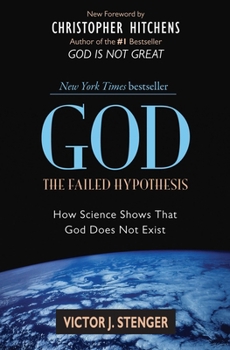God: The Failed Hypothesis: How Science Shows That God Does Not Exist
Select Format
Select Condition 
Book Overview
Throughout history, arguments for and against the existence of God have been largely confined to philosophy and theology, while science has sat on the sidelines. Despite the fact that science has... This description may be from another edition of this product.
Format:Paperback
Language:English
ISBN:1591026520
ISBN13:9781591026525
Release Date:April 2008
Publisher:Prometheus Books
Length:310 Pages
Weight:0.99 lbs.
Dimensions:0.7" x 6.0" x 9.0"
Customer Reviews
3 ratings
Highly recommended
Published by Thriftbooks.com User , 17 years ago
This is an outstanding book. Victor Stenger, a Professor of both Physics and Astronomy, convincingly argues against the existence of God (by which he means the Judea-Christian-Islamic version) by examining a wide variety of scientific evidence. In my view Stenger succeeds in disproving God beyond a level of reasonable doubt. Certain high profile atheists (Richard Dawkins and Same Harris, to name but two) have already written bestsellers on this subject, and I would evaluate Stenger's work as one that fully deserves the same level of success and recognition. The structure of the book is roughly as follows: In the first chapter, Stenger lucidly explains the scientific method and what makes it such a potent investigative tool. This is important because many people have no real understanding of these concepts. He also refutes the widely held (at least, by religious people) view that science has nothing to say about religion. This is a very important point, which sets the foundation for the rest of the book. Stenger also deals with another common misconception, which is that scientists are somehow opposed to, or in denial of the discovery of any supernatural forces, whether religious, psychic, or anything else which violates the natural laws as they are currently understood. In reality the only reason why most scientists do not acknowledge the evidence of such things is because the evidence does not exist. In the remainder of the book, Stenger goes on to assess the objective evidence for and against the God hypothesis by investigating a plethora of scientific and historical research. He covers everything from biblical prophecies to the illusion of design to prayer experiments and much more. All of this research could very well have produced compelling evidence for God, but none of it has. Stenger logically concludes that the evidence looks exactly the way we would expect it to look in the absence of God. As a mild criticism, I found that certain topics could have been covered in a bit more detail. On the other hand, some of these issues could easily form the subject of entire books, and so it would have been almost impossible to discuss them in full detail within just a single chapter. Overall I think the author has penetrated to the heart of most of the important issues, and there are plenty of references for those who which to carry out further reading. Chapters 4 and 5 (entitled Cosmic Evidence and The Uncongenial Universe) deserve a special mention. These two chapters are the undisputed gems of the book, in my opinion. Perhaps this is not so surprising given Stenger's expertise in physics and astronomy. For me personally, the knowledge I gained from these two chapters was easily worth the price of book by itself, and it was an absolute joy to have my eyes opened to some of the mind-boggling secrets of the universe that have been yielded by the investigative efforts of physicists and astronomers. Things do get a little hard to follow at times,
A "Designing" and "Intervening" God isn't there
Published by Thriftbooks.com User , 17 years ago
Having just finished the book moments ago, I was left with the distinct impression that I liked it better than almost any other non-fiction book that I have read lately. One thing that I liked immensely about "God: The Failed Hypothesis" was its focus on science and showing that it is by far the best way to know the universe, not necessarily the only way, but indeed the best and most accurate method available to human beings to learning about life and all of its mysteries. Preceding my reading of "G:TFH," I had just finished "Atheist Universe" by David Mills and while I agreed with almost everything he had to say, that book left me with an ambiguous feeling towards its merit. Not so the case with Stenger's book; it could almost be called uplifting. As a former evangelical, who has studied almost every religion at least in a cursory manner, I am convinced that a personal, religiously affiliated, or intervening god does not exist and is a mere psychological projection. However, I had still remained somewhat agnostic toward the concept of a deistic god. Stenger shows that modern physics can indeed answer such seemingly hard questions as "Why is there something rather than nothing?" rather convincingly. This book weakened my position of agnostic deism from "maybe" to "probably not" because complete naturalism seems to be the best and most likely explanation.
Devastating critique of the God Hypothesis
Published by Thriftbooks.com User , 17 years ago
Stenger's book is a devastating critique of the historical and current attempts to justify the existence of the traditional Judeo-Christian-Islamic God. In this book the arguments of intelligent design theories are easily demonstrated to be without merit. Stenger also invades the arena of the various rationalist arguments for the existence of God, handily disposing of these arguments with clear and penetrating logic. Next the premise that the Universe is especially congenial for life is analyzed which reveals that any God should have done a much better job making the Universe a more comfortable home for his special creatures. Finally, Stenger demonstrates the logical incompatibility of an all knowing, all powerful and all good God and the Universe we actually live in. This book is a treasure for anyone seeking a resource to refute theistic assertions and provides nourishing food for thought for undecided seekers of truth.







